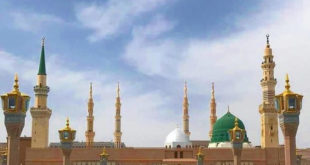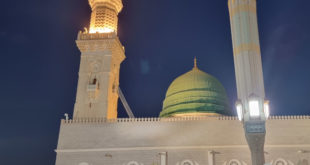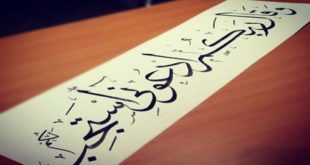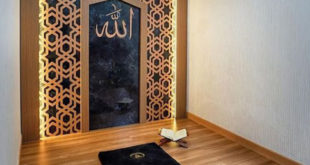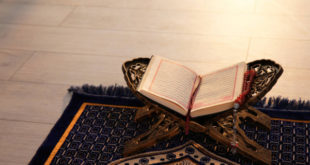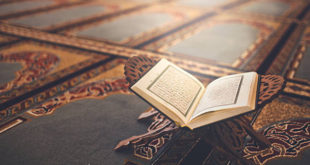عَن ابن عمر رضي الله عنهما قال قَالَ رَسُولُ اللهِ صَلَّى اللهُ عَلَيهِ وَ سَلَّمَ رَأَيتُ كَأَنِّي أُتِيتُ بِقَدَحٍ مِن لَبَنٍ فَشَرِبتُ مِنه فَأَعْطَيتُ فَضْلِي عُمَرَ بنَ ا لخَطَّاب قاَلوُا فَمَا أَوَّلْتَه يا رَسُولَ الله ؟ قَالَ العِلْمُ (الترمذي رقم 2284) Hadhrat ibn Umar (Radhiallahu Anhuma) reports that Rasulullah (Sallallahu …
Read More »Recent Posts
May, 2013
-
23 May
Sunnats and Aadaab of Eid – Part 2
1. Go to the Eidgah early.
2. Walk to the place of Eid Salaah.
Hazrat Sa’d bin Abi Waqqaas (radhiyallahu ‘anhu) reports that Rasulullah (sallallahu ‘alaihi wasallam) would proceed towards the Eid Salaah walking, and would return walking.
Read More » -
22 May
The Noor of the Heart and Commitment to the Sunnat
To gain visibility one requires two types of lights: the light of the eyes and the external light of the sun or a lamp etc. Then only will one be able to clearly see what is before him. With the absence of any one of the two one will not …
Read More » -
22 May
Surah Inshiqaaq
Tafseer of Surah Inshiqaaq by Hadhrat Mufti Ebrahim Salejee Saheb Size: 2.3 MB Format: mp3 [haiku url=http://ihyaauddeen.co.za/audio/tafseer/2011-09-23_Surah_84.mp3] [wpdm_file id=59] Source: Al-Haadi
Read More » -
22 May
Sadaqatul fitr on behalf of one’s wife and baaligh children
Q: If a person discharges sadaqatul fitr on behalf of his wife and baaligh children who are not being supported by him without their permission, will the sadaqatul fitr be discharged? A: The sadaqatul fitr will not be discharged. ولا يجوز أن يعطي عن غير عياله إلا بأمره كذا في …
Read More »
-
The Lofty Position of Hazrat Abu Ubaidah (radhiyallahu ‘anhu) in the Sight of Hazrat Abu Bakr (radhiyallahu ‘anhu)
The Lofty Position of Hazrat Abu Ubaidah (radhiyallahu ‘anhu) in the Sight of Hazrat Abu …
Read More » -
Rasulullah (sallallahu ‘alaihi wasallam) Practically Showing to the Ummah the Esteemed Position of Hazrat Abu Ubaidah (radhiyallahu ‘anhu)
-
Fear of Allah Ta’ala
-
The Quality of Consideration for Others in the Life of Hazratjee (rahimahullah) – Part Two – Adherence to The Sunnah – Part 46
-
The Abstinence of Hazrat Abu Ubaidah (radhiyallahu ‘anhu) from the Wealth of the World
-
Receiving Seventy Rewards
Hazrat Abdullah bin Amr bin Aas (radhiyallahu ‘anhuma) reported, “Whoever sends salutations upon Nabi (sallallahu ‘alaihi wasallam) once, Allah Ta‘ala and His angels will send seventy mercies and blessings upon him in return of his one Durood. Hence, whoever wishes to increase his Durood should increase it, and whoever wishes to decrease his Durood should decrease it (i.e. if he wants to earn great rewards, then he should increase his Durood).”
Read More » -
Increase in Sustenance
-
The Reward of Fasting on the Day of Arafah
-
The Angel that Stands at the Blessed Grave of Hazrat Rasulullah (sallallahu ‘alaihi wasallam) to Convey the Durood of the Ummah
-
Reciting Durood when Entering the Musjid
-
Sunnats and Aadaab which every person needs to adhere to in his individual life – 8
20. The people one befriends should be people of piety and taqwa. Through taking such …
Read More » -
Sunnats and Aadaab which every person needs to adhere to in his individual life – 7
-
Sunnats and Aadaab which every person needs to adhere to in his individual life – 6
-
Sunnats and Aadaab which every person needs to adhere to in his individual life – 5
-
Sunnats and Aadaab which every person needs to adhere to in his individual life – 4
-
Hazrat Ali (radhiyallahu ‘anhu) – Part Forty-One – Being Sent by Rasulullah (sallallahu ‘alaihi wasallam) to Level the Graves, Destroy Idols and Erase Pictures
Hazrat Ali (radhiyallahu ‘anhu) reports that on one occasion, Rasulullah (sallallahu ‘alaihi wasallam) attended a …
Read More » -
Rasulullah (sallallahu ‘alaihi wasallam) Approving of the Verdict of Hazrat Ali (radhiyallahu ‘anhu) – Part Forty
-
The True Ulamaa – Hazrat Ali (radhiyallahu ‘anhu) – Part Thirty Nine
-
Du‘aa for Assistance in Settling Debts – Hazrat Ali (radhiyallahu ‘anhu) – Part Thirty Eight
-
The Concern of Hazrat Ali (radhiyallahu ‘anhu) regarding Business being Conducted According to the Islamic Principles – Part Thirty Seven
 Ihyaaud Deen An Effort to Revive Deen in Totality
Ihyaaud Deen An Effort to Revive Deen in Totality





































